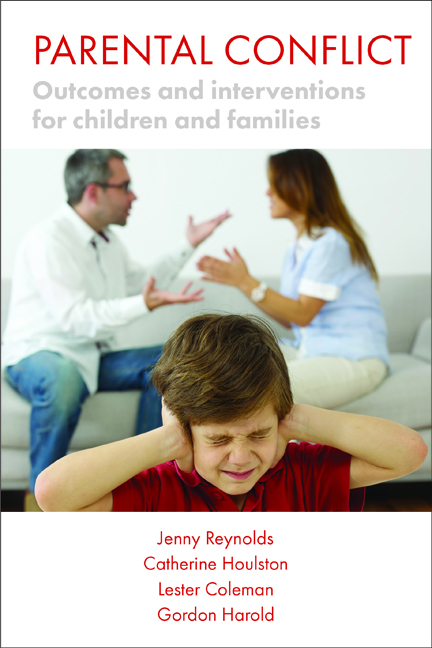Book contents
- Frontmatter
- Contents
- Foreword
- Preface
- 1 Conflict in context
- 2 Understanding different types of conflict
- 3 The impact of inter-parental conflict on children
- 4 How does inter-parental conflict affect children?
- 5 Risk and resilience: why are some children affected more than others?
- 6 Review of conflict-based interventions for couples
- 7 Implications for practice: How to help families
- 8 Conclusions and recommendations
- References
- Index
7 - Implications for practice: How to help families
Published online by Cambridge University Press: 04 February 2022
- Frontmatter
- Contents
- Foreword
- Preface
- 1 Conflict in context
- 2 Understanding different types of conflict
- 3 The impact of inter-parental conflict on children
- 4 How does inter-parental conflict affect children?
- 5 Risk and resilience: why are some children affected more than others?
- 6 Review of conflict-based interventions for couples
- 7 Implications for practice: How to help families
- 8 Conclusions and recommendations
- References
- Index
Summary
This chapter explores the implications of the findings presented in the last chapter on couple interventions. It aims to highlight what this means for those working with families in trying to help parents manage their conflict and avoid its potentially harmful influence on children. The limitations of current intervention research and new innovative ideas for dealing with inter-parental conflict are also highlighted in this chapter.
When should we intervene?
Early intervention is believed to offer benefits in longterm outcomes and is considered to be more effective than treatment-based interventions, which are provided once problems arise (Rutter, 2010). Many of the programmes presented in the last chapter focus on a prevention-based approach by identifying couples and families who may be at risk of experiencing higher stress and couple disagreement, rather than those who are already characterised by entrenched levels of conflict. Even the programmes aimed at separated and divorced parents predominately target those with a more normative and less extreme conflict style (McIntosh and Deacon-Wood, 2003). It is widely recognised that behaviour change is greater and more sustainable with earlier intervention, rather than trying to change ingrained and longstanding patterns of interaction (Dolan et al., 2010).
Early intervention is important, but how early is early enough?
The evidence from relationship education or preparation programmes indicates that couple interventions have traditionally been applied to couples entering marriage. Entry to marriage represents a key time for intervention as some couples may face significant challenges as they adapt to the changes and new commitment in their relationship. However, for many couples, marriage may not represent the beginning of a relationship in the same way as it did in the past. The majority of couples now cohabit before marriage and a growing number also have a child or children outside of marriage (Hunt, 2009; Lloyd and Lacey, 2012). These changes in relationship formation mean that interventions are also offered during other transition points and life course changes, such as the transition to parenthood.
A diverse and flexible approach of when to target relationship intervention may be best in order to reach couples when they are more receptive to help and support, and perhaps more motivated to change behaviours if necessary (Halford, 2004; Hawkins et al., 2004; Cowan et al., 2010).
- Type
- Chapter
- Information
- Parental ConflictOutcomes and Interventions for Children and Families, pp. 105 - 126Publisher: Bristol University PressPrint publication year: 2014



